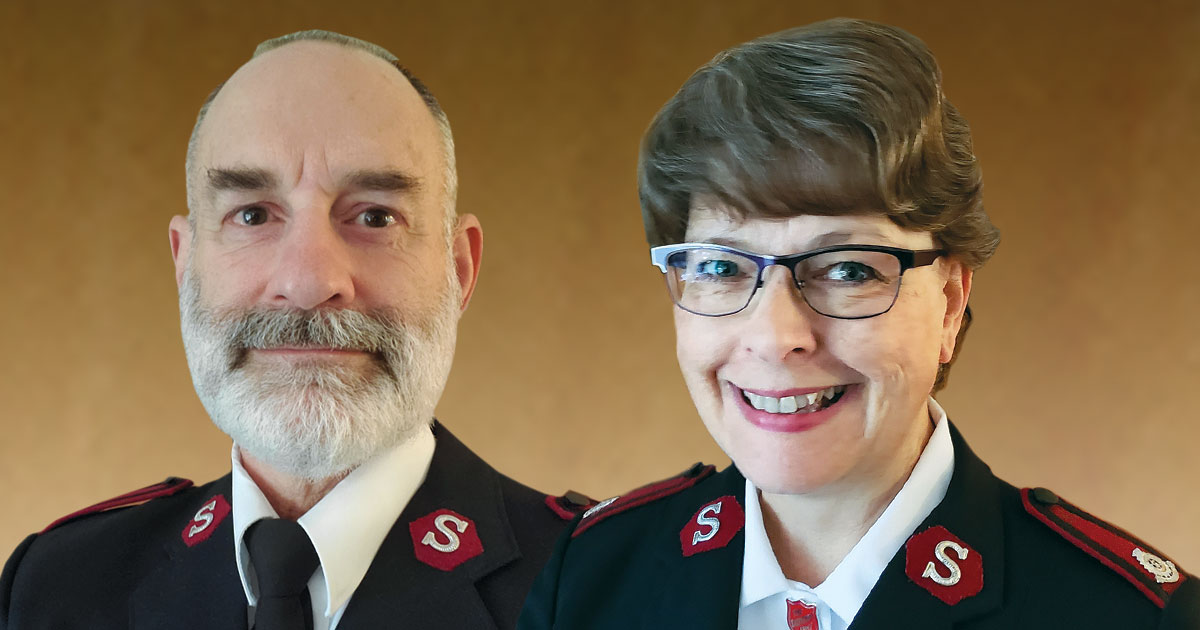Majors Brian and Deborah Coles were commissioned in 1989 as part of the Ambassadors for Christ Session from the College for Officer Training (CFOT) in Toronto. Since that time, 27 of their 31 years of service as Salvation Army officers have been spent in corps appointments. News editor Pamela Richardson caught up with them in their current appointment as corps officers at Southmount Citadel in Vancouver to ask them to share their thoughts on the important role of the corps officer and some of their fondest memories of ministry.
When did you recognize the call to officership?
Major Brian Coles: My call to officership was a gradual calling. Over several years following the rededication of my life to the Lord, I had an increasing sense of dissatisfaction with what I was doing in life concurrent with an increasing awareness that the Holy Spirit was leading me to be involved in ministry. Meeting my soon-to-be wife, who also sensed God’s call on her life to ministry, sealed the deal, so to speak, for us both.
When did you recognize the call to officership?
Major Brian Coles: My call to officership was a gradual calling. Over several years following the rededication of my life to the Lord, I had an increasing sense of dissatisfaction with what I was doing in life concurrent with an increasing awareness that the Holy Spirit was leading me to be involved in ministry. Meeting my soon-to-be wife, who also sensed God’s call on her life to ministry, sealed the deal, so to speak, for us both.
Major Deborah Coles: I knew I was meant to be an officer from about the age of 12. My parents were my examples; they practised at home what they preached on Sunday. But my dad always said, “If you can be anything else, don’t be an officer,” meaning he wanted us to be sure of our calling. Being an officer is not like a “regular” job.
Where have you served across the territory?
BC: We have served as corps officers from coast to coast, beginning in Dartmouth, N.S., to our current appointment at Southmount Citadel in Vancouver. We also served for four years on the staff at the CFOT in Toronto.
What has been your biggest joy in serving as a corps officer?
BC: My biggest joy has been to teach and preach God’s Word and see people grow and mature in the faith.
DC: I like being able to spend time preparing sermons and Bible studies. This is a privilege; many who work at other jobs just don’t have that time. I also appreciate the flexibility of being in corps. Every day is different, and it’s wonderful to work side-by-side with my husband, my best friend.
What has been your biggest challenge?
BC: My biggest challenge has been keeping up with all the changes on the administrative side of the work.
DC: Moving away from people I love and moving our kids from people and places they loved was hard, especially once they were a little older. Another challenge is finding and developing leaders.
How has the role of a corps officer changed?
DC: The world has changed a lot in the past 30 years, but corps officership remains basically the same in that you are a “generalist,” rather than a “specialist,” in any field. What has changed is the number of additional expectations being placed on a corps officer. A day could include leading a chapel service at a care home, preparing a sermon, doing administrative work and visiting a hospital. Added to that are such things as completing a degree; learning about issues from human trafficking to missing Indigenous women to orphans to homelessness, and perhaps preaching about them; sorting toys, standing by kettles, helping with the Santa Shuffle and packing Christmas hampers; participating in various corps ministries; and keeping the corps building in good shape, just to name a few. The pandemic has certainly affected our ministry, as well. We can’t meet for fellowship in the usual ways and preparing for Sunday worship includes cleaning, physical distancing and temperature-taking.
What is your fondest memory of ministry?
BC: My fondest memory of ministry is getting to do what we do with my best friend, who also happens to be my wife, Deborah.
DC: One of my fondest memories of ministry is seeing each of my kids enrolled, along with other corps kids, as junior soldiers. Being in a hospital in the presence of death and life is an awesome and holy experience. Being asked to officiate at a wedding or the dedication of a baby gives much joy, and I treasure opportunities to lead someone to Christ.
What advice would you give to newly commissioned officers?
BC: Love your people, and remember that ministry is like running a marathon, not a sprint.
DC: If you are going to be an officer, be a happy one. And take a Sabbath day as a spiritual discipline.
Where have you served across the territory?
BC: We have served as corps officers from coast to coast, beginning in Dartmouth, N.S., to our current appointment at Southmount Citadel in Vancouver. We also served for four years on the staff at the CFOT in Toronto.
What has been your biggest joy in serving as a corps officer?
BC: My biggest joy has been to teach and preach God’s Word and see people grow and mature in the faith.
DC: I like being able to spend time preparing sermons and Bible studies. This is a privilege; many who work at other jobs just don’t have that time. I also appreciate the flexibility of being in corps. Every day is different, and it’s wonderful to work side-by-side with my husband, my best friend.
What has been your biggest challenge?
BC: My biggest challenge has been keeping up with all the changes on the administrative side of the work.
DC: Moving away from people I love and moving our kids from people and places they loved was hard, especially once they were a little older. Another challenge is finding and developing leaders.
How has the role of a corps officer changed?
DC: The world has changed a lot in the past 30 years, but corps officership remains basically the same in that you are a “generalist,” rather than a “specialist,” in any field. What has changed is the number of additional expectations being placed on a corps officer. A day could include leading a chapel service at a care home, preparing a sermon, doing administrative work and visiting a hospital. Added to that are such things as completing a degree; learning about issues from human trafficking to missing Indigenous women to orphans to homelessness, and perhaps preaching about them; sorting toys, standing by kettles, helping with the Santa Shuffle and packing Christmas hampers; participating in various corps ministries; and keeping the corps building in good shape, just to name a few. The pandemic has certainly affected our ministry, as well. We can’t meet for fellowship in the usual ways and preparing for Sunday worship includes cleaning, physical distancing and temperature-taking.
What is your fondest memory of ministry?
BC: My fondest memory of ministry is getting to do what we do with my best friend, who also happens to be my wife, Deborah.
DC: One of my fondest memories of ministry is seeing each of my kids enrolled, along with other corps kids, as junior soldiers. Being in a hospital in the presence of death and life is an awesome and holy experience. Being asked to officiate at a wedding or the dedication of a baby gives much joy, and I treasure opportunities to lead someone to Christ.
What advice would you give to newly commissioned officers?
BC: Love your people, and remember that ministry is like running a marathon, not a sprint.
DC: If you are going to be an officer, be a happy one. And take a Sabbath day as a spiritual discipline.










Comment
On Friday, January 15, 2021, Jason Dockeray said:
On Friday, January 8, 2021, Randy Holden said:
On Friday, January 8, 2021, Tom Ellwood said:
On Thursday, January 7, 2021, Miriam Leslie said:
On Sunday, January 3, 2021, Nancy Pepper said:
On Thursday, December 31, 2020, Juanita Wagner said:
On Wednesday, December 30, 2020, Colleen Kimberley said:
On Wednesday, December 30, 2020, Colleen Winter said:
On Wednesday, December 30, 2020, Margaret Reid said:
On Wednesday, December 23, 2020, Patrick Lublink said:
Leave a Comment